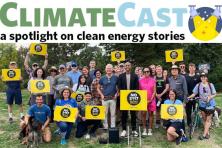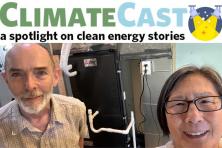Who’s still debating the existence of climate change? Sigh.
One of the main organizations connected to last week’s Republican presidential debate was the American Conservation Coalition — a conservative environmental group whose young leadership hoped to use the event to uplift conservative responses to the climate crisis that are not rooted in denial. It shouldn’t be a surprise that the issue would come up in the context of an ostensibly wide-ranging national political debate; nearly two-thirds of Americans perceive that climate impacts are having an effect on their own community, and majorities support solutions such as accelerating clean energy development. The debate moderators brought up current, alarming climate impacts such as rising ocean temperatures — an appallingly relevant concern this week given the destructive force of Hurricane Idalia — and followed up with a question for the assembled candidates: how would they “calm fears that the Republican Party doesn’t care about climate change?” The candidates’ responses mostly demonstrated that they are lagging far behind the younger voters in their own party. As Naomi Ishisaka noted in the Seattle Times, “We are now undeniably in a climate crisis, but judging from [this debate], only half the country knows it.”
Back at the presidential debate, several candidates refused to respond at all; only former South Carolina Governor Nikki Haley acknowledged climate change as a real problem, before placing the blame on emissions from China and India. Editor’s note: North Dakota Governor Doug Burgum has previously committed to make his state carbon-neutral by 2030, though he did not bring this up during the debate.
The loudest response came from political neophyte Vivek Ramaswamy, who proclaimed that climate change is “a hoax” and claimed that “more people are dying of climate change policies than they actually are of climate change.” Overall, the candidates’ responses did little to suggest that the conservative political establishment is open to considering real climate solutions, instead offering up what Rebecca Leber described as “a disturbing level of climate denial.” It is significant, however, that young conservatives were able to raise the issue at all in such a mainstream forum. It is also noteworthy that Ramaswamy’s strident climate denial was audibly booed by members of the debate live audience.
Ironically, uncontrolled climate impacts have caused major problems for traditional Republican constituencies, including rural communities with limited capacity to plan for climate resilience and small businesses facing risks associated with extreme weather. Meanwhile, federal clean energy subsidies introduced as part of the Inflation Reduction Act have been shown to disproportionately benefit red states.
The future of Environmental, Social, and Governance (ESG) investing in question
Younger investors are paying close attention to companies' environmental and social impacts, mainly through self-published Environmental, Social, and Governance (ESG) reports. ESG-driven corporate investing is not a new phenomenon, but it's become one of the latest battlegrounds in the American culture wars. Republican lawmakers in 37 state legislatures have introduced bills to remove climate and ESG reporting as factors for investing. This directly attacks investors' and institutions' ability to make informed choices. The US Securities and Exchange Commission (SEC) is expected to recategorize climate hazards as a component of financial risk, but this won't standardize corporate ESG reporting. Despite investor pressure and federal policy changes, investment companies like Vanguard and BlackRock have rejected widespread calls to focus on more environmentally conscious investments. Despite the efforts of corporate and elected climate deniers, ESG-driven investing is likely here to stay and remain a vital means to pressure big polluters to clean up their act.
The future of clean transportation is now
Last week, more than 800 fleet managers, clean transportation advocates, and vehicle manufacturers gathered at the 23rd Annual Green Transportation Summit & Expo (GTSE) in Tacoma, Washington. The event, organized by the Columbia-Willamette Clean Cities Coalition, offered workshops, vendor exhibits, and networking opportunities focused on clean vehicles and transportation policy. Additionally, dozens of fleet vehicles, including drayage trucks, street sweepers, and bulldozers, were on hand for attendees to see up-close and test drive, many of which were powered by zero-emission electricity.
Editor’s note: Climate Solutions was on the ground at GTSE this year; check out our Instagram and Flickr pages for additional coverage.
A surprise highlight was actually the chartered tour bus used to shuttle attendees between conference venues. Seattle-based transportation company MTRWestern sent their first zero-emission motor coach in revenue service for the event. The brand-new Van Hool CX45E was borrowed temporarily from its regular assignment transporting Amtrak Thruway passengers between Seattle and Bellingham, Washington to whisk GTSE attendees around Tacoma in style. Climate Solutions staff attending the conference gave the electric bus rave reviews, as it offered all the creature comforts of a brand-new tour bus but with an exceptionally smooth, quiet ride and zero diesel exhaust.
With significant dollars earmarked for investment in clean transportation in the federal Inflation Reduction Act, Washington state's Climate Commitment Act (CCA), and low-carbon fuel standards, we can expect to see even more zero-emission vehicles of all sizes on the road.
What we’re listening to
In this week’s What we’re listening to, guest-hosted by Rogé Karma, the senior editor for “The Ezra Klein Show” When Great Power Conflict and Climate Action Collide, explores the real power and political ramifications of a shifting global energy system. As the global economy scrambles to mine materials for the green energy sector, where those mines are located, where the refinement happens and the manufacturing takes place, all have serious consequences for current economic order. It isn’t a coincidence that the Inflation Reduction Act is attempting to push for solar industry development, China currently controls upwards of 70% of that market. There is a wave of protectionism taking hold around the globe, and the green economy is at the heart of it.




